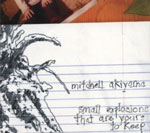

Mitchell Akiyama
Small Explosions That Are Yours To Keep
(Sub Rosa)
On his debut album of Hope That Lines Don't Cross, Mitchell Akiyama created a minimal electronic release that gurgled with touches of the Chain Reaction label and echoed different artists doing similar things. Over the course of his following releases, Akiyama has really stretched out and broken into new territory, exploring the fine line between electronic and organic music. In addition to creating his own music, he's also started and runs the label Intr.Version, which has released a slew of great releases by everyone from The Beans to Desormais (a side-project of Akiyama's).
If his last few albums saw him moving towards a certain point, Small Explosions That Are Yours To Keep definitely feels like the realization of a goal. On this release, Akiyama recorded compositions and improvisations for piano, strings, gamelan, and other instruments, then took those recorded pieces and ran them through the digital blender. The result is something that perhaps oddly still feels very organic, despite stumbling and shifting through digital realms at times.
Akiyama actually started off his musical career with a jazz background, and this is one of his first releases that actually feels like it has the living and breathing movements of jazz, even if it's not using the same instrumentation. "Strategies For Combating Invisibility" opens the release with repetitive chimes that eventually build into a pattern as strings struggle to break free of digital processing and the track flourishes about halfway through. "But Promise Me" builds in a much different way as upright bass strums mingle with flickering electronics, slowly building strings and more chimes before the whole thing finally locks in place for an almost upbeat and melodic section complete with layered handclaps.
The title of the release is actually quite apt for the release, as it never really bursts forth in a loud or overwhelming way but instead consistently creates great little moments where the organic instrumentation blends seemlessly with digital manipulation. Although the album loses focus a bit in places (the long "Overhead Then Exit" is especially guilty), for the most part the release succeeds because Akiyama has started with compositions that are in and of themselves at least partially interesting and doesn't completely rely on digital manipulations to make them so. Instead, the filtering and electronics added to the release serve as sort of a unique touch that helps to add dynamics to the already-interesting instrumentation. Several steps beyond his debut, Akiyama is proving himself to be an adventuresome artist.
Rating: 7